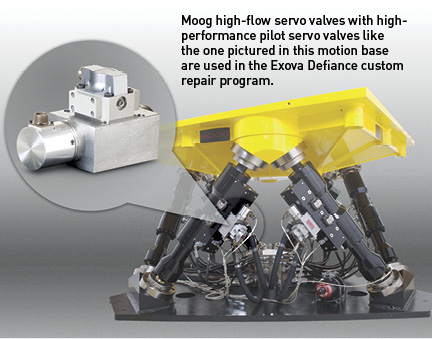Custom Repair Program for Servo Valves Keeps Test Rigs Running

Proving grounds aren’t always the most effective way to test the durability of a truck or car. If a car maker wants to evaluate, for example, a light truck frame or suspension, then testing groups often get a call to simulate any number of road conditions. The results from strength, compression, and vibration tests help car makers build a better product. Michigan-based Exova is an example of a testing group that conducts simulations using equipment such as an 18-channel, full-vehicle inertial road simulator. “We can complete some tests in a day; others take more time,” says Jeff Taylor, supervisor of the Exova Defiance Technical Services Group. “A testing program for a frame maker can last more than a year.”
Test groups like Taylor’s employer test the prototype frame, and then the frame maker will run a few samples off the production line, which they also assess. To make these simulators run, each test rig relies on the operation of high-performance servo valves. Exova Defiance runs everything from single-channel tests, which require one servo valve, to large custom test rigs with 20 or more channels, which employ 30 or more valves.
What is your test rig riding on?
A well-made servo valve is a dependable piece of technology. That’s important because—no pun intended—test groups and car makers have a lot riding on them. Until a few years ago, the most important thing about the nearly 600 servo valves Exova Defiance owns (other than keeping them running) was finding the closest, least expensive, and most dependable repair shop to fix the valves when they failed.
The servo valve controls how hydraulic fluid is channeled to an actuator, which will simulate a variety of stress factors. When it comes to performing fatigue testing, servo valves that employ mechanical feedback are generally thought of as having the fastest response time, enabling a test house to cycle a specimen to a point of fatigue in the shortest time.
When a test house puts stress on a vehicle system or component, says Taylor, it needs “high-response servo valves to get the desired results.” If there are excessive particulates or dirt in the fluid running through the servo valve, it will affect the performance of, and accelerate the wear on, the servo valve. Servo valves will fail if operators are not maintaining the proper level of cleanliness in the fluid. If a test rig begins behaving erratically, it’s often a telltale sign that the servo valve requires maintenance.
“Our largest reliability issue with servo valves was ‘ball glitch,’” added Taylor. This occurs when a valve operates in even a mildly contaminated environment for hundreds of thousands of cycles. When a test house runs a flow plot on one of its test stands, operators can easily identify this issue by plotting the output of current versus flow.
Considering the quality of repair
In the greater Detroit area, there are at least a dozen local hydraulic repair facilities that advertise servo valve repair capability. Exova Defiance would send its valves to these companies due to their quick turnaround times, competitive prices, and no shipping costs. In 2009, Moog (the company that makes most of the servo valves used by Exova Defiance) asked Taylor to consider Moog for servo valve repairs.
While controlling servo valve repair costs is important, test houses also consider the repercussions of a failed test. For instance, the worst-case scenario would be a catastrophic failure that would cause a cylinder to cycle full stroke (or force) and damage a customer test specimen and invalidate a test. Many projects have a very limited quantity or even one-of-a-kind test samples. More often, servo valves simply exhibit erratic behavior (e.g., instability, glitches, etc.). When an operator swaps valves during a test, he or she will always be focused on whether or not the new valve is performing exactly the same as the old one prior to the problem.
When evaluating a servo valve repair partner, take into account how a manufacturer supports independent repair shops, the quality of repairs being made, and the availability of upgrades. Some servo valve manufacturers sell parts and offer support to independent repair companies. Other manufacturers might centralize repairs at a single authorized service facility; these manufacturers do not sell repair parts or publish test specifications. And they would be the only source for an OEM-quality repair. It’s also worth asking if your servo valve repair partner will include a free upgrade to its latest technology product.
A customized approach
“Moog told us that regardless of our circumstance and priorities, it would customize a repair program to help us,” said Taylor. “Moog arranged to maintain a stock of its servo valves in Plymouth, Mich., near our test laboratories.”
By repairing the servo valve and, when appropriate, upgrading the servo valve to the latest model revision using a carbide feedback ball, a longer-lasting design that Moog invented, Exova Defiance always has a ready supply of servo valves. To simplify the repair administration process, Moog offered a fixed price based on a blended rate of its three standard repair levels; this also eliminates the need for quotes or purchase order revisions.
“This local, customized support combined with the carbide ball upgrade caused us to switch from our local repair house to working with our manufacturer,” said Taylor.
What Taylor was able to get with the customized repair program was a local inventory, a fixed price for repairs, and a like-new repair job or upgrade. Moog warrants the entire valve for two years, even when it only performs a clean-and-calibrate service. It’s like purchasing a brand-new valve. After three years, we’ve signed a two-year renewal contract.
“The customized repair program keeps our test rigs running smoothly, improves the quality of our servo valves, and comes at a price we can afford,” remarked Taylor.
For more information: Steven Beddick is the aftermarket sales manager for Moog Industrial Group, a division of Moog Inc. He has nearly 30 years of experience with application engineering support for industries ranging from automotive to power generation. Beddick holds a bachelor’s degree in electrical engineering from Grove City College. Visit www.moog.com/valverepair






